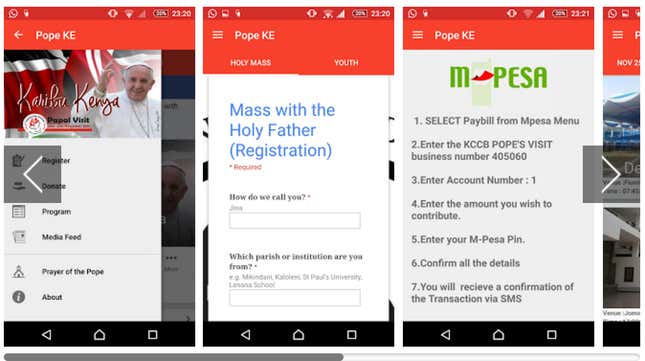Pope Francis lands in Nairobi on Wednesday (Nov. 25) and over a million East African visitors are willing to do whatever it takes to cast their eyes on the holy Pontiff on his first ever visit to the region. But do they need an app for that?
That question has pitted two defining cultural traits of East Africa’s largest economy against each other. Known as Africa’s “Silicon Savannah,” Nairobi’s tech industry has been steadily gaining a reputation as one of Africa’s most progressive start-up communities—especially for building mobile apps. But Kenyan culture is also deeply infused with a social conservatism rooted in widely held religious traditions and values.
That’s why a newly launched mobile application is being looked at by developers in Kenya as a test case for measuring the potential of new technologies to navigate these cultural contradictions and religious taboos.
The app, dubbed Pope Visit KE, was developed by iLab Africa, a tech hub run by Nairobi’s Strathmore University. It allows users to not only register to attend events during the Pope’s historic three-day visit to the Kenyan capital, but also follow along with prayers, make a financial donation to the Church or keep up to date with Pope-themed news alerts.
The Kenya Conference of Catholic Bishops commissioned the tool, but so far, only a small percentage of the faithful have been compelled to test it out. The day before the Pope’s arrival, the app had less than 500 downloads, a fraction of the millions of people expected to be following the Pope’s visit.
But despite the seemingly small number of users, the apps lead technical developer Lee Birir believes that faith-themed apps are on the rise in Kenya.
While developers based in the United States or Europe, where large religious organizations often boast significant budgets for media and online community outreach, have created hundreds of religious apps in the last few years, churches and mosques in Kenya are less likely to have websites or reach out to their congregations on social media. 80% of Kenyans identify as Christian. A recent research project found that of the 1,500 churches in Nairobi alone, only 29 had websites. Only 12 maintained easily searchable Twitter handles.
And so, while Nairobians are more and more frequently passing time on the matatu bus scrolling through the Bible on their phone, on apps designed by American Evangelical organizations like Life Church, the Nairobi tech scene has been hesitant to try to bridge that gap between religion and technology itself, says Lee Birir.

Connecting the two is still largely considered off limits, he adds. “I would say that the draw to creating religious apps is still not as strong for developers here. People still consider religion a highly personal matter.”
It’s a trend that Lee and his brother Brian, also a software development engineer, are hoping to change.
In October, Brian Birir, also a Christian preacher, hosted Nairobi’s first ever religious-themed hackathon as part of Code for the Kingdom, an international initiative that aims to bring developers together to create applications that better the world from a Christian perspective. Simultaneous hackathons were held in cities across the world, from Dallas to Jakarta.
Kenya’s rapidly growing smartphone market and emerging app culture may present developers of faith-based apps with a market opportunity. In 2015, nearly 60% of phones sold in the country were smartphones, almost 2 million devices.
Brian Birir believes that technology has a role to play in the domain of traditional religious life. But the low turnout at the event, he says, is representative of the fact that there still exists a strong social taboo, a discomfort, with melding those two worlds together.
“Many Kenyans think religion is going to Church on Sunday and then the rest of the week it’s back to business.” But by using technology, religion can play a more prominent role in our day-to-day lives, he says.
